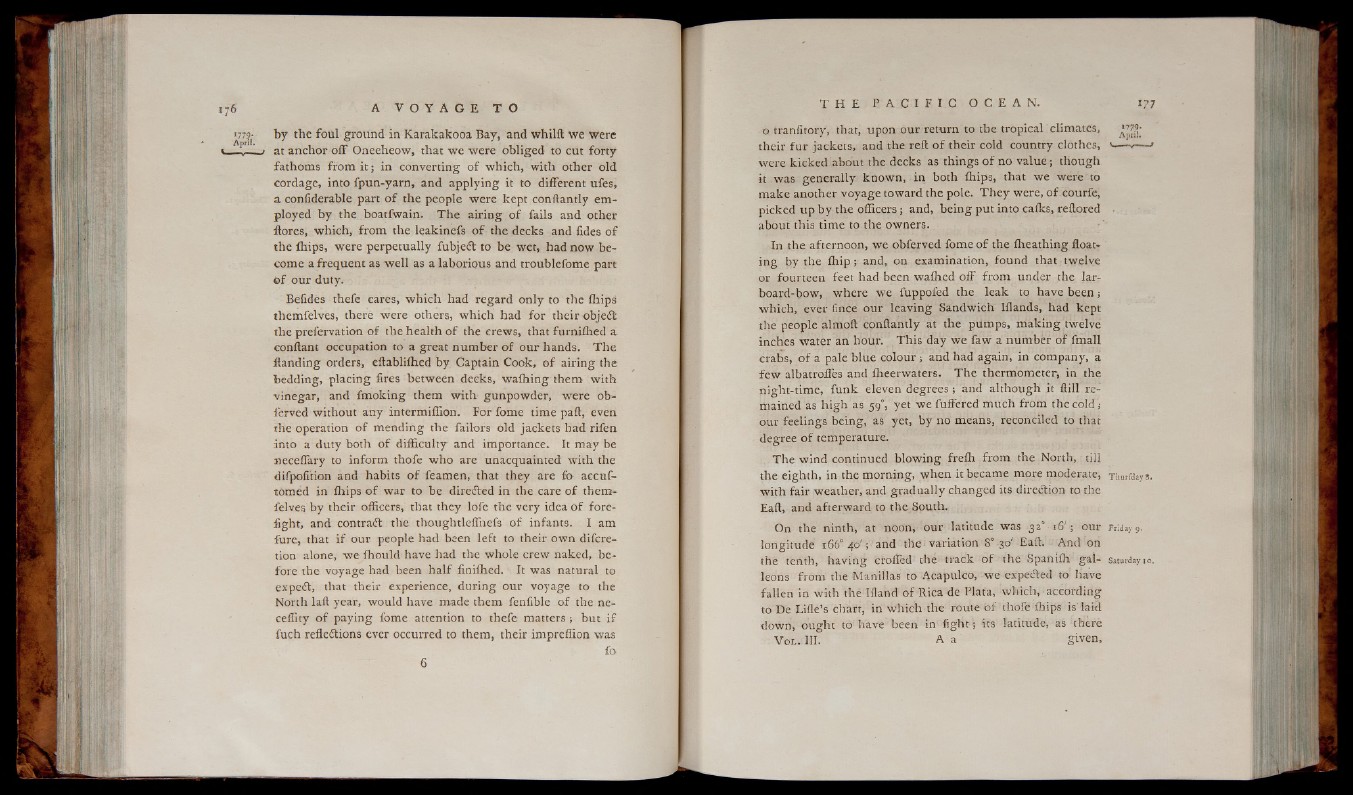
1779. b y the fou l ground in Karakakooa Bay, and whilft we Were
« ■ at anchor o ff Oneeheow, that w e were obliged to cut forty
fathoms from i t ; in converting o f w hich, with other old
cordage, into fpun-yarn, and applying it to different ufes,
a confiderable part o f the people were kept conftantly employed
by the boatfwain. T h e a irin g o f fails and other
ftores, which, from the leakinefs o f the decks and fides o f
the fhips, were perpetually fu b je ft to be wet, had now become
a frequent as w e ll as a laborious and troublefome part
o f our duty.
Befides thefe cares, w h ich had regard only to the fhips
themfelves, there were others, w h ich had fo r their object
the prefervation o f the health o f the crews, that furniflied a
conftant occupation to a great number o f our hands. T h e
Handing orders, eftabliihed by Captain Cook, o f airin g the
bedding, placing fires between decks, w a fh in g them with
vinegar, and fm o kin g them w ith gunpowder, were ob-
ferved without any intermiifion. For fome time pail, even
the operation o f mending the failors old jackets had rifen
into a duty both o f difficulty and importance. It may be
neceffary to inform thofe w ho are unacquainted w ith the
difpofition and habits o f feamen, that they are fo accuf-
tomed in ffiips o f war to be directed in the care o f them-
felves by their officers, that they lofe the very idea o f forefight,
and contrail the thoughtleffnefs o f infants. I am
fure, that i f our people had been left to their own difcre-
tion alone, w e ihould have had the whole crew naked, be fore
the voyage had been h a lf finilhed. It was natural to
e xp e it, that their experience, during our voyage to the
North laft year, would have made them fenfible o f the ne-
ceffity o f paying fome attention to thefe matters but i f
fuch refleitions ever occurred to them, their impreffion was
fo
o tranfitory, that, upon our return to the tropical climates, swg*
their fu r jackets, and the reft o f their cold country clothes, 1 »
were kick ed about the decks as things o f no value ; though
it was gen era lly known, in both ihips, that we were to
make another voya ge toward the pole. T h e y were, o f courfe,
picked up b y the officers ; and, b e in g put into calks, reftored .
about this time to the owners.
In the afternoon, w e obferved fome o f the iheathing floatin
g by the fhip ; and, on examination, found that twelve
or fourteen feet had been walhed o ff from under the lar-
board-bow, where w e fuppofed the lea k to have been ;
w hich, ever fince our lea v in g Sandwich Illands, had kept
the people almoft conftantly at the pümps, m a k in g twelve
inches water an hour. This day we faw a number o f fmall
crabs, o f a pale blue colour ; and had again, in company, a
few albatroffes and iheerwaters. T h e thermometer, in the
night-time, fu n k eleven degrees ; and although it ftill remained
as h ig h as 590, yet we fuffered much from the cold ;
our feelings being, as yet, by no means, reconciled to that
degree o f temperature.
The wind continued b lowin g frefh from the North, till
the eighth, in the morning, when it b ecame more moderate, Timrfdays.
w ith fair weather, and grad ually changed its direction to the
Eaft, and afterward to the South.
On the ninth, at noon, our latitude was 32° 16 '; our Friday 9.
longitude 1660 4 P ; and the > variation 8° 30' Eaft; And on
the tenth, ha vin g crofted the track o f the Spanilh g a l- Saturdays,
leons from the Manillas to Acapulco, we expected to have
fallen in with thé Ifland o f Rica de Plata, which, according
to De Lille’s chart, in w h ich the route b f thofe fhips is laid
down, ou ght to have been in fight f its latitude, as there
V o l . III. A a given,